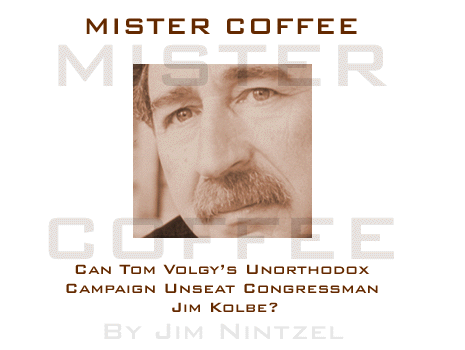
Democrat Tom Volgy is the first real challenger Jim Kolbe has faced since he won office.
TOM VOLGY HAS told the same story hundreds of times in the last
year. He sets the stage by explaining that, when he first began weighing
a run against seven-term Congressman Jim Kolbe in Southern Arizona's
District 5, he got a call from the national Democratic Congressional
Campaign Committee.
 "They said, 'We are so excited that you're running. You
have great name ID, we've done our polling, we know that Kolbe's
really vulnerable. We think this could be the race in Arizona.
You've never lost a race in Pima County. Help is on its way.'
Forty-eight hours later, I received a Fedex package in the mail.
It's 12-and-a-half pounds. It's a list of all the PACs that are
the problem.
"They said, 'We are so excited that you're running. You
have great name ID, we've done our polling, we know that Kolbe's
really vulnerable. We think this could be the race in Arizona.
You've never lost a race in Pima County. Help is on its way.'
Forty-eight hours later, I received a Fedex package in the mail.
It's 12-and-a-half pounds. It's a list of all the PACs that are
the problem.
"I stared at it and asked, 'What are these guys doing?'
Then all of a sudden it underlined the point: If I were a Republican
running against an incumbent Democrat and the Republicans thought
I had a real shot, they'd send me the same list. These guys don't
buy Democrats or Republicans, they just buy Congress.
"And I looked at that and I thought, 'If we're going to
do this, we can't do it this way. We're going to have to do it
the other way. Somebody's gotta stop this guy.' I thanked them
for the kindness and said I appreciated the prop. Because it is
a great prop and I take it with me everywhere--but I turned down
the PAC money.
"Then they called back and said, 'We can give you up to
$50,000-$60,000 in support--will you take soft money?' And I said
no, I won't take soft money. If that's what it takes, I'm going
to lose this race. I believe that's not what it takes. I think
it takes something entirely different."
THAT "SOMETHING entirely different" has been a run for
office that's eschewed the trademarks of a modern campaign: No
pricey political consultants, no opinion polls, no PAC money.
Instead, Volgy has pledged to raise a quarter-million dollars--approximately
68 cents per voter in District 5--and to campaign by talking about
politics at 200 house parties, or "coffees."
Aside from playing to one of his biggest strengths--Volgy is
great one-on-one and in front of small groups--the strategy also
allows him to drive home a central theme in his campaign: Congressmen
are bought and sold by PACs, and Kolbe has leased out the 5th
Congressional District to the highest bidder. The strategy is
risky, which Volgy openly acknowledges: "Our gamble is that
people are smart, that they can see through this."
Kolbe, who is also facing Libertarian Phil Murphy (see "Give
Me Libertarian," opposite page) and Reform Party candidate
Bob Connery, dismisses Volgy's complaints. "My voting record
has not changed since I went there. It's been a fiscally conservative
voting record, strong on national defense, what I think to be
pro-environment and very moderate on most of social issues. His
charge just falls on flat water because there's nothing there
to substantiate or support it."
But PAC contributions have flowed into the Kolbe campaign. According
to data released from the Federal Election Commission on October
1, Kolbe has pulled in $198,200 from PACs during the 1997-'98
election cycle, while receiving about $245,000 from individuals.
Volgy says the those PAC contributions shape Kolbe's voting record:
"There's a whole history of Jim coming back to Tucson and
saying, "I'm your neighbor, I'm your friend, and I'm your
voice in Washington,' and then going back to Washington and particularly
in the last four or five years, voting in an entirely different
way than people expect him to. I thought at first I was crazy
when I started looking at his voting record, and then I realized
this was his voting record."
Among the votes Volgy criticizes:
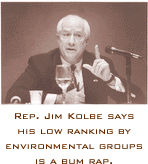
- In July, Kolbe voted to kill a HHS Appropriations bill,
ending the Summer Youth Program in Pima County, which provided
$1.6 million for 800 jobs for kids.
- In July, Kolbe voted to end emergency assistance to poor
working families.
- Kolbe voted against increasing the minimum wage, but voted
to cut estate taxes on people whose estates exceed $17 million.
- Kolbe voted against funding to retrain dislocated workers.
- Kolbe has voted against funding for more teachers in the
classroom, for smaller classes, and for improving classroom technology.
He voted in support of vouchers for students who attend private
and religious schools. "He's voted against every major educational
initiative introduced in the Congress that would have a positive
effect on the issues facing public schoolchildren," Volgy
says.
- Kolbe supported giving $18 billion to the IMF to bail
out Russia and Asia, but voted against a bill that would have
suspended support for Russia if the country continued to provide
missile technology to China. Volgy says these votes "reflect
a narrow, single-minded emphasis on the idea that the answer to
all our international problems is international trade, at any
cost. It's very much reflective of his campaign contribution record,
and which multinationals that do very well in China are giving
him money. It doesn't take a rocket scientist to say that we will
not allow Chinese imports based on child labor and slave labor.
Why can't you vote for that? Why can't you say to the Russians,
if you export missile technology, we will no longer do trade with
you?"
- In August, Kolbe voted against the House version of campaign
finance reform, the Shays-Meehan bill.
"I think Jim believes that with enough money and enough
TV commercials, he can paper over all of this," Volgy says.
While his strategy has its critics, Volgy has been successful
in his fundraising efforts. Earlier this week, when his campaign
hit the quarter-million-dollar mark, Volgy held a press conference
and asked people to stop sending checks--a move he calls a first
for a viable congressional candidate.
A political science professor at the UA who served for a decade
on the Tucson City Council and another four years as mayor, Volgy
is a smart politician with a solid background in policy-making.
His stint in city government has left him with good name ID. "I'm
learning that the longer you've been out of office, the better
a mayor you've been," Volgy jokes. "Give me another
year and I'll be most perfect mayor there's ever been."
Following his exit from city politics, Volgy jumped into the
race to replace U.S. Rep. Morris Udall in Congressional District
2, but lost a three-way primary to Rep. Ed Pastor in 1991. Since
then, he's split his time between teaching at the UA and working
as executive director of the International Studies Association,
a Tucson-based organization of 3,600 scholars and policy makers
around the country who specialize in international relations.
He's traveled extensively through Eastern Europe and the former
Soviet Union as part of a State Department program, helping the
new struggling countries develop into democracies. Those trips
have put him in touch with his roots: As a child, Volgy escaped
Hungary with his parents as the Iron Curtain came down. His parents
immigrated to America and he became a naturalized citizen at age
16.
He's no stranger to campaign finance reform, either. During his
stint on the City Council, he played a key role in designing Tucson's
system for publicly financed campaigns, which was passed by voters
in the 1980s. Under Tucson's system, candidates who meet stringent
requirements and agree to spending limits are eligible for matching
funds from city taxpayers.
"We're the only major city in America where campaign costs
have gone down," Volgy says. "It costs now a quarter
what it cost to run for mayor in 1983. Find a city in the United
States where that's true."
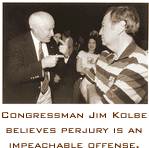 BESIDES THE issue of campaign finance reform, Volgy has been pounding
five other policy areas: education, environment, health care,
Social Security and the environment.
BESIDES THE issue of campaign finance reform, Volgy has been pounding
five other policy areas: education, environment, health care,
Social Security and the environment.
"Across the board on the five major issues we're talking
about in this campaign, he's on the wrong side of everything,"
Volgy says. "His environmental record, for example, is just
wretched."
Environmental groups agree. Last month, the Sierra Club and the
League of Conservation Voters endorsed Volgy and slammed the incumbent
for voting to relax pollution control components in the Clean
Water Act, voting to decrease funding for the EPA, and supporting
increased logging on public lands.
"I think I am getting a bum rap, but I'm not surprised,"
says Kolbe, arguing that environmental groups almost always support
Democrats. "My record on the environment, I think, is very
good."
Kolbe points to his work creating the new Udall Environmental
Mediation Center. "A lot of these organizations are more
interested in litigation than they are in actually solving problems,
because litigation is how they raise their money. They're not
interested in solutions to problems; they're interested in keeping
the issue alive. I'm interested in solving the problem. The mediation
center, I think, is a good example of how we can use the resources
of the Udall Center to resolve conflicts so they don't have to
go to litigation."
He also cites his work establishing the San Pedro Conservation
Area and the Gila Box Conservation Area, and his work expanding
the boundaries of Saguaro National Park.
That latter example has recently been mired in controversy. According
a recent story in the Seattle Times, the land trades that
made the expansion possible involved a fishy appraisal process
that left one government appraiser--who was fired after he complained
about the deal--saying taxpayers had lost out on approximately
$8 million in the deal. The beneficiary of this government generosity:
None other than legendary land speculator Don Diamond, a big supporter
of Kolbe.
"I don't know how accurate those stories are," Kolbe
says. "Obviously, I don't have anything to do with the appraisals,
who does the appraisals, or who those people are. I've never even
heard of any those people, I've never met them, never talked to
any of them, I've never talked to any of the agencies about how
the appraisals are done. The only thing I ever did was prod them
to get moving with the exchanges. Certainly the taxpayers ought
to get their money's worth. There's no reason they should be shortchanged.
We should have appraisals that are fair, correct and the taxpayers
should get every dollar's worth."
Volgy also blasts Kolbe for failing to oppose ASARCO's plans
for an open-pit mine in the Santa Ritas last year. The mining
company hoped to swing a land trade with the U.S. Forest Service
that would have secured enough land to develop an open-pit mine
in plain sight of scenic Highway 82. Volgy traveled to Washington
in a delegation to lobby against the proposed deal. He says Kolbe's
office ducked the fight. "And that's about open-pit copper
mining, which virtually no one but the mining industry supports
anymore," Volgy says.
"It's interesting that he would say that, because now he's
saying we shouldn't follow a process," Kolbe retorts. "There
was a process that was in the very, very early stages for that.
They simply were putting forth a mining plan. It was way, way
too early for me to take a step in opposition to that one when
we didn't even know what they would be suggesting. As it turned
out, with the decline in copper prices, that's been put on hold
for the foreseeable future. If they had gone ahead, we were talking
about something that was at the very least 12 to 15 years away.
So it wasn't as though there wasn't plenty of time to look at
this very carefully and make some decisions about that."
THE CANDIDATES ALSO clash on economic issues. Kolbe touts his
leadership on the NAFTA issue, declaring NAFTA a success because
it has created 11 million jobs.
Volgy doesn't quibble with that figure, but suggests "we
have lost enormous numbers of well-paying jobs and they've been
replaced by jobs that don't pay a living wage." He argues
moreover that NAFTA has allowed employers to keep wages low with
just the threat of a move to Mexico.
Kolbe has aggressively pushed for changes in the Social Security
system. He supports taking about 16 percent of the current FICA
tax and allowing workers to invest that money in bonds, stocks
or government instruments.
"You have the choice," he says. "You want to invest
in government instruments just like Social Security does, fine.
If you want to take more risks, as I think most young people would,
you can put (the money) in bonds or in stocks and watch it grow
over the years."
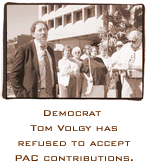 Volgy's plan would instead remove the cap on earnings above $68,000
and exempt the first $15,000 in income, which he says would mean
a tax break for both low-income workers and small businesses that
have to match that $15,000.
Volgy's plan would instead remove the cap on earnings above $68,000
and exempt the first $15,000 in income, which he says would mean
a tax break for both low-income workers and small businesses that
have to match that $15,000.
"Raising (the cap) is certainly a possibility, but to eliminate
it altogether would make the Social Security tax so progressive
you couldn't survive. It would be like 10 or 100 times more progressive
than the income tax," retorts Kolbe, who adds that making
the first $15,000 exempt "turns it into a welfare program.
You don't pay anything, and that was always the concept: Franklin
Roosevelt said everybody, no matter how much they make, should
pay something into Social Security for their retirement. By eliminating
that other $15,000, you'd have more than double the amount of
loss of revenue that (Volgy) suggests you'd have. So it would
make the current system we have worse."
They differ on tax policy as well. Volgy favors keeping the progressive
tax system and scrapping most of the deductions worked into the
tax code, while Kolbe says he's still trying to decide the best
way to reform America's progressive tax system.
"I haven't made a decision as to what I think is the best
answer," explains Kolbe. "I think I probably lean toward
the flat tax."
"We've got the same silly, hypocritical game going on here,"
Volgy says. "Congress has just said to us, 'We're about to
eliminate the tax code as you know it, and we're not going to
tell you what we're going to replace it with.' When they do that,
what they're really saying to the American public is, 'We know
what we're going to replace it with, but we don't want you to
vote on it before November 3.' "
Volgy says the GOP's two alternatives--a flat tax or a national
sales tax--each result in higher taxes for most Americans. The
national sales tax, he argues, would require a 30-percent sales
tax. "That is a sales tax of such enormous proportion that
everybody gets screwed except the top two percent of Americans--not
to mention cheaters and evaders. You take the existing taxes and
make it even more unfair by hurting everyone except the richest
Americans."
Then there's Kolbe's preferred alternative, the flat tax: "A
revenue-neutral flat tax would have to be 21, 22, 23 percent to
generate the same amount of revenue," Volgy scoffs. "More
than three-quarters of Americans pay less than 15 percent right
now. So more than three-quarters of Americans would see a dramatic
boost in their taxes if we go to a flat tax of 21 to 23 percent.
The only ones who are going to be significantly helped will be
the top three or four percent of Americans."
Kolbe concedes that the flat-tax rate could run as high as 21
percent--which would result in a tax hike for three-quarters of
the American people.
"It could result in a tax increase for a lot of people,"
Kolbe says. "I've heard figures ranging from 17 up to about
21 percent. One of the reasons there is that range is you don't
know what the behavior of people would be. Right now you have
a lot of incentive to hide income, to figure out ways to not report
income. If you have a flat tax, you don't have as many reasons
because the tax rate is going to be lower. There's not going to
be as many reasons to avoid declaring income...But that concern
is certainly a legitimate one."
AN ARTICULATE, well-funded Democrat with good name ID against
a vulnerable, incumbent Republican with tight ties to special
interests--in 1996, when the national Democratic team was pushing
voter turnout in Arizona, Volgy might have clobbered Kolbe.
But 1998 is the Year of Monica. Since January, the Democrats
have been rocked by an ugly sex scandal that has President Bill
Clinton on the edge of impeachment. Political analysts are still
debating the impact the scandal will have on the midterm elections,
although the GOP is backing away from earlier predictions of landslide
gains in Congress. But Clinton's troubles are almost certainly
not going to drive Democratic voters to the polls on election
day; analysts are predicting a low turn-out and conventional wisdom
favors incumbents.
The Kolbe campaign isn't openly capitalizing on the troubles
in the White House, perhaps because the incumbent's own sex life
became a major story during his re-election run two years ago,
when he came out as gay to defuse an upcoming exposé of
his private life in the pages of The Advocate, a national
gay and lesbian magazine. The magazine's editors had chosen to
out Kolbe after he cast a vote in favor of the Defense of Marriage
Act, which banned gay and lesbian marriages.
Despite the manner in which his own private life was invaded,
Kolbe doesn't seem too concerned about a taxpayer-funded investigation
which delved into consensual sexual affairs in the White House,
ostensibly to investigate the possibility of obstruction of justice
in a politically motivated civil suit which was subsequently tossed
out of court. And Kolbe draws a sharp distinction between his
own infidelity with his wife and Clinton's indiscretions.
"Nobody ever called me to testify in front of a grand jury,"
Kolbe says. "There's clearly a differential there. If you
testify before a grand jury, under oath, that's no longer private."
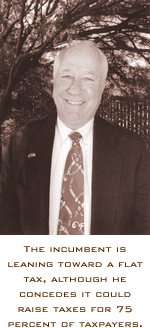 But Kolbe did take an oath to serve in the U.S. Navy--which required
him to state that he was not a homosexual. He says now he was
not actively gay during his service.
But Kolbe did take an oath to serve in the U.S. Navy--which required
him to state that he was not a homosexual. He says now he was
not actively gay during his service.
As for the charges in the Starr report, Kolbe says he has to
weigh all the evidence before he can decide whether to proceed
with impeachment. But he says lying under oath is enough to remove
Clinton from office: "In the abstract, is perjury an impeachable
offense?" Kolbe says. "Yes, perjury is an impeachable
offense."
Volgy disagrees. "There isn't an American today who's not
embarrassed, hurt or angered by what the President has done...,"
he says, "but I've read the Constitution a lot on this and
I've listened to Constitutional scholars, and they seem to have
made it clear, as disgusting as it is and whether or not it's
a felony--and it is a felony--perjury about this is not what the
impeachment process was about." He favors indicting Clinton
after he completes his term of office and treating him like any
other citizen accused of a similar crime.
AS THE CAMPAIGN rolls into the final weeks, Kolbe and Volgy have
been meeting in debates.
Over the weekend, both Kolbe and Volgy visited the Outoberfest
rally at Reid Park. Volgy criticized the GOP leadership in Washington
for its latest round of gay-bashing.
Kolbe struck back the next day during a debate at the Jewish
Community Center, stressing his record on hate-crimes legislation.
"I've been a supporter of it since I was in the Arizona Legislature.
I'm a co-sponsor from the day it was introduced of the current
legislation in Congress today."
"I never suggested that Jim did not support hate-crimes
legislation," Volgy responded. "I simply indicated it
was important to go beyond hate crimes. We must stop the venom
and hatred and pandering to groups that engage in venom and hatred
in the leadership of the Republican Party." As the crowd
began to spontaneously applaud, Volgy continued: "I'm talking
not about Jim. I'm talking about Tom DeLay, I'm talking about
Trent Lott, I'm talking about Dick Armey, I'm talking about a
Newt Gingrich who said to the Republicans: We are not nasty enough."
The only openly gay Republican in Congress, Kolbe says he stands
up to GOP gay-bashing in his own way: "I have obviously stood
up in my caucuses, I have spoken to the leaders. I think a lot
of that is better done privately. But most importantly is by the
very way I conduct myself professionally. And I think conducting
myself as I have, I can be a leader and do the job, whether it's
appropriations, trade, Social Security or any of the other assignments
the leadership has given me, and whether or not I'm gay doesn't
make any difference."
At the JCC debate, Kolbe concluded with a dig at Volgy, whom
he addressed as "Professor Volgy" throughout the morning.
"Some of the things we've heard here today may be great
in a classroom, but in real life, the solutions that Mr. Volgy
is presenting are not really the right answers."
"I've been waiting for the punchline for an hour and 20
minutes," Volgy retorted. "Jim is very smart. There's
a reason why he's been calling me Professor for the last hour
and 20 minutes, and that's to deliver the punchline. He could
have called me Tom, he could have called me Mayor...He just kept
calling me Professor so you guys would get the point that I'm
in another world and he's in the real world--the real world of
Washington, D.C. A world where last year $1.1 billion was spent
by lobbyists, where this year that $1.1 billion will go up to
$1.5 billion. Where special interests roam the halls of Congress,
controlling most aspects of our public policies.
"Jim is not a bad guy in any of this. He does work hard,
he does come home a lot, he does hold a lot of town halls. He's
caught in a destructive, corrupt system that is the last bastion
of legal bribery in America.
"I really think this is the problem. If you think this is
professorial, let me say it to you one more time: I want to see
the U.S. House of Representatives that the forefathers wanted.
I'd like to see one where influence peddlers have no influence,
where special interests are not special, where big-money interest
don't have a backdoor to the halls of government. If that's professorial,
then vote for the other guy. But if that is what we believe in,
we have a choice this time--someone who has taken no PAC money,
someone who has aspired to not take more than $2,000 from individuals,
someone who has been to more than 186 house parties to bring us
together in a common partnership. That may be academic to some,
but I think it's at the heart of who we are as Americans."
Give Me Libertarian
 Phil Murphy Offers Voters An Alternative To The Status Quo.
Phil Murphy Offers Voters An Alternative To The Status Quo.
PHIL MURPHY'S MANTRA is "Constitutional authority."
If elected, the Libertarian candidate says, he would emulate
the late Sen. Barry Goldwater: "Goldwater said he's not going
to support any program, plan, scheme, whatever, no matter how
much he likes it or how much it could help or hurt, until he asks
if its constitutionally permissible. And that's the reason we're
in the state we're in today: We just ignore the supreme law of
the land. Just because it feels good and it may be good doesn't
mean it's constitutionally permissible."
The 39-year-old Murphy is running an aggressive campaign against
Rep. Jim Kolbe and Democrat Tom Volgy. It's Murphy's second run
against Kolbe; in 1994, he got about four percent of the vote
while running as a replacement candidate for the Libertarians.
He didn't take the campaign too seriously that year, but for this
run, he's raised $8,000 and plans a media blitz in the final days
of the campaign, with radio and TV ads.
Although he's skeptical about Volgy's chances against Kolbe,
Murphy thinks the media perceives the Democrat as a viable candidate,
so the race will get considerable attention. As a result, he's
hoping for a platform to espouse his Libertarian view.
Blessed with a great sense of humor, Murphy smoothly delivers
that view: He's opposed to nearly every form of government regulation.
He'd scrap just about every three- and four-letter agency in the
federal government--EPA, FDA, FEC, OSHA--and those he didn't scrap,
he'd privatize. He'd sell off National Parks like the Grand Canyon
("It would be cleaner, the toilets would work and they'd
make a profit at it") and open Alaskan wilderness to oil
drilling. For him, the unfettered free market is a glorious sight:
"People may not like it," he says, "but the free
market always works."
And if someone happens to cut corners and turn your property
into a hazwaste zone: "If you're polluting and that affects
somebody else, that affects their life, liberty and property,"
Murphy explains. "That's what court systems are for."
For him, the federal government needs more than a trim--it needs
a serious buzz cut, maybe even a scalping. "It's very difficult
for people to understand that reducing government to its proper
limitations is the only thing that's going to save us. We're a
socialist country now--we just don't realize it, because we still
get to have fun and do stuff."
But he says the U.S. is moving closer and closer to a police
state: "It scares me that the EPA has three SWAT teams. Why
in the hell does the EPA have a SWAT team? Democrats and Republicans
are of like mind on one thing: There's only two kinds of Americans--those
who are in jail and those who ought to be."
Murphy has a simple gripe with Kolbe. "He lies,"
Murphy says, "with every breath he takes. The No. 1 thing
is he lies about votes. This is a long track record. And once
he gets caught in it, here comes the explanation: 'Well, I didn't
vote for that when it first came up but I had to vote for it when
it came up again because it was part of a bigger package.' So
he'll stand with you when it doesn't count for real, but when
it counts for real, he's like Cartman in South Park: 'Screw
you guys, I'm outta here.' "
Pop-culture references come easily to Murphy, who also writes
about film for a local magazine. A vociferous champion of the
Second Amendment, Murphy says the federal government's closure
of the Tucson Rod & Gun Club pulled him into the race. "The
thing that set me off was to see Kolbe taking credit for calling
those hearings on the Rod & Gun Club. He's on the front page
of both papers, he's on the TV, saying he called these hearings?
For God's sake, he didn't even know they existed until (Rep.)
Don Young's staff came down to his office on Swan and wanted to
use a phone. Then he went into panic mode. This guy would lie
to you in his white hat on white horse to take credit for anything.
People think Clinton has a serious problem with, shall we say,
being as forthright as necessary? Kolbe's just that in miniature."
Murphy says he hopes voters will support him to send a message
to the incumbent: "Highest goal: I want to screw up Mr. Kolbe
and make him pay a price for putting us through all the crap he's
put us through. Either I eat him up enough that Volgy has a chance--which
is a real reach--or I can drag him at least into a plurality."

|





